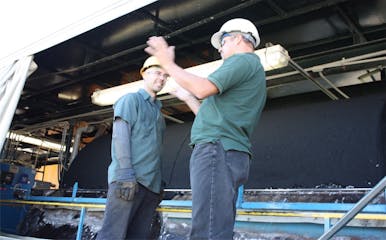The process of solids capture is a cornerstone of waste management productivity for innumerable reasons. Some people within the agricultural and environmental industries may already be aware of capturing solids and its various advantages. For those that do not know, solid capturing or dewatering is essentially the process of wastewater being divided into its liquid and solid constituents. In other words, the not-so-useful sludge we call wastewater is converted into two resources that possess much more utility: freshly treated water and nutrient-rich biosolids. Read ahead to discover how this by-product of water treatment is an economic, environmental, and agricultural asset.
Economic Benefits
Biosolids that are sifted from wastewater would normally be a nuisance that would be expensive to dispose of; however, biosolids have been found greatly beneficial when it comes to agriculture, forestry, lawn maintenance, and home gardening. As well, a lack of solid capture would be more costly for water treatment facilities as it would lead to more frequent maintenance and the breakdown of certain mechanical processes over time. Those that use biosolids on their soil will see economic benefits in their crop yields and overall soil quality. Furthermore, these people will save money as this valuable resource reduces the need for chemical fertilizers.
Could your business save money on wastewater disposal cost?
Environmental Benefits
Since biosolids are a recycled commodity, they are helping the environment simply by reducing what needs to go to the landfill. For farmers, gardeners, and foresters that fertilize with biosolids, they can avoid using chemical fertilizers that have adverse effects on the surrounding environment. Even the process of isolating biosolids from wastewater through dewatering is an eco-friendly act since it improves overall water quality. This means safer drinking and swimming water for us as well as for fish habitats. The suspended solids that biosolids are eventually removed from a can actually harbour a variety of viruses and damage a fish’s respiratory system. To sum it up, biosolids promote more environmentally conscious soil and water maintenance while reducing the impact of our ever-growing landfills.
Agricultural Benefits
In addition to being economically and environmentally viable, biosolids have also proven a precious resource for the agricultural industry. As previously mentioned, biosolids reduce the need for chemical fertilizers; this makes for safer, more natural land while removing a notable expense. The high-quality composition of biosolids is worth mentioning as well. They contain nutrients that are vital to plant growth like phosphorus, nitrogen, and potassium. Besides these valuable nutrients, biosolids also offer a variety of heavy metals that are considered invaluable micronutrients for plant life. These micronutrients include but are not limited to zinc, nickel, copper, molybdenum, cobalt, and selenium. The presence of these key nutrients equates to greater crop growth and yields and further enriched soil. There is a reason why biosolids are being used in similar areas of expertise ranging from forestry to mine reclamation.
In short, solid capturing has allowed us to create a revolutionary commodity. Biosolids are an opportunity to improve the quality of our fields and the environmental quality of our world as a whole. If you are ever in need of an eco-friendly compost or fertilizer, biosolids are certainly worthy of your consideration.
